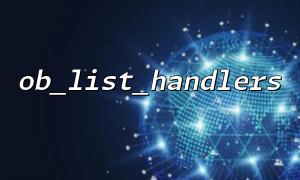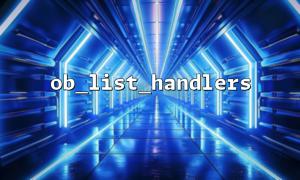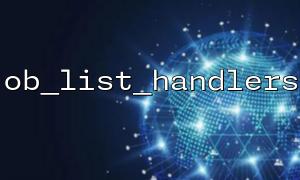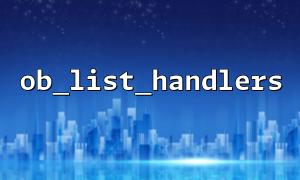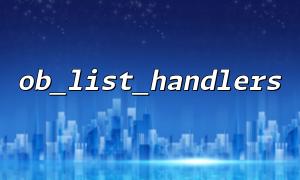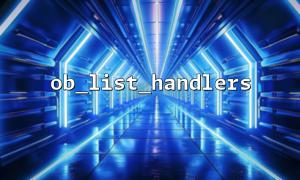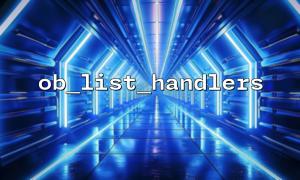ob_list_handlers is a function in PHP that is closely related to the output buffering mechanism. It is used to return all output buffering processing functions registered in the current PHP script. When using output buffering, it is important to understand the correct usage of ob_list_handlers . However, due to the details of its functions and usage, developers often make some common mistakes during actual use.
This article will analyze common misuses of ob_list_handlers and give the correct usage method to help developers avoid these common pitfalls.
ob_list_handlers is a built-in function in PHP to obtain all registered output buffering functions (handlers) in the current PHP script. These processing functions process the data in the buffer sequentially, and you can view the list of buffer functions in the current processing process.
Output buffering is a prerequisite for the normal operation of the ob_* series functions. If you call ob_list_handlers without the output buffering enabled, an empty array will be returned or no output will be available.
Error example:
$handlers = ob_list_handlers(); // Output buffering is not enabled
print_r($handlers);
This code will return an empty array after running, because no buffering function is registered.
Correct usage:
First, the output buffering should be started via ob_start() :
ob_start(); // Start output buffering
$handlers = ob_list_handlers();
print_r($handlers); // Print the current output buffer processing function
In this way, ob_list_handlers() can return the correct list of buffer processing functions.
ob_list_handlers returns a list of processing functions arranged in registration order. If the developer mistakenly thinks that the content in the list can be directly manipulated, an error may occur.
Error example:
$handlers = ob_list_handlers();
if (isset($handlers[0])) {
ob_end_clean($handlers[0]); // mistake:Try manually clearing the buffer function
}
This usage is wrong because ob_list_handlers returns a function list and does not directly provide operational permissions to the buffer. You should use ob_end_clean() or other related functions to control the output buffering, rather than operating directly on the function list.
Correct usage:
ob_start(); // Start output buffering
echo "Some output";
ob_end_clean(); // correct:Clear and close the current buffer
PHP supports nested output buffering, and developers may mistakenly try to clear processing functions that are not at the current buffer level if they are not aware of this.
Error example:
ob_start();
ob_start(); // 嵌套Start output buffering
$handlers = ob_list_handlers();
echo "Test Output";
ob_end_clean($handlers[0]); // mistake:Buffer functions should not be operated directly
This practice will lead to the developer's mistaken belief that nested output buffer processing functions can be directly manipulated, but in fact, nested buffers should be cleared one by one in order.
Correct usage:
ob_start(); // Start the outermost output buffering
ob_start(); // Start the output buffering of the inner layer
echo "Inner Output";
ob_end_clean(); // Clear the inner buffer
echo "Outer Output";
ob_end_clean(); // Clear the outer buffer
Before calling ob_list_handlers() , be sure to make sure that the output buffer has been started. Buffering can be started by ob_start() or other related functions.
After obtaining the list of buffer functions, the buffer should be operated as needed. Usually, ob_end_clean() is used to clear the current buffer content and turn off the buffer, ob_get_contents() is used to get the buffer content, and ob_list_handlers() is only used to debug and view buffer processing functions.
When dealing with nested buffers, be careful to clear the buffers one by one to ensure that each layer of buffers is closed in order.
Forgot to enable output buffering : without calling ob_start() , call ob_list_handlers() directly and you will get an empty array.
Direct operation of buffer function list : ob_list_handlers() returns a list of buffer functions and cannot be used directly for buffer operations.
Wrong buffer clearing order : Nested buffers should be cleared one by one in hierarchy rather than skipping the buffer.
ob_list_handlers is a useful tool for debugging and checking PHP output buffers, but it is not a function that manages buffers directly. The correct way to use it should ensure that the output buffer is started and the buffer contents are cleared as needed. If you do not pay attention to these details, it is easy to lead to unnecessary mistakes.
I hope that through the analysis of this article, we can help you avoid common errors when using ob_list_handlers and better understand PHP's output buffering mechanism.
